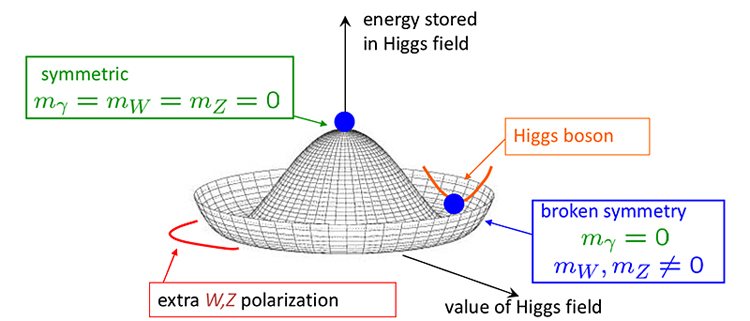
This past month marks what looks like the confirmation of the Higgs Particle, or what has been called “The God Particle.” Like most things quantum, the Higgs Particle is simultaneously the Higgs Field, and its confirmation is a big deal.
The Standard Model in modern physics posited the possibility of the Higgs, and its existence was necessary to provide the proper symmetry upon which the Standard Model rests. The many quantum particles of the model display varying mass, except for those that are “force” particles, like the gluons that bind the neutrons and protons of the atomic nucleus. How or why the masses vary has not been well understood, and the Higgs provides the beginning of that answer.
The Higgs Field, it is proposed, is an all-pervading, invisible and until recently undetectable space-filling force that imparts mass to quantum particles. The mechanism through which this happens has been theorized but not proven, and all that has been observed to date have been the “tracks” that the super temperature particle-splitting process leaves behind.
Ironically, the idea of an all-pervading force that permeates space and imparts mass to all matter does sound very god-like, and at a minimum has its place in most mystical traditions. The ancient Chinese Hwa-Yen Buddhists (200-800 AD) called such a force Li, and said that all physical forms (which they called Shih) embodied and were manifestations of Li. This idea of an underlying principle, a unifying force that generates and imparts existence, was therefore at work in all things, people included. The ancient yogic practices of India, (yoga literally means “union”) and other mind/body wisdom traditions are rooted in practices which make manifest the unity and completeness underlying existence. Sufis, Native Americans, Taoists and followers of many religious traditions find solace and meaning in connecting with this all-pervading force.
Prior to the 20th century, in the history of physics the idea of the existence of the “aether” was widely accepted. The aether was characterized as an all-pervading, invisible force through which all other observed forces – electricity, gravity and magnetism – were transmitted and made manifest. In its way, the aether provided an analogue to Einstein’s “cosmological constant,” the invisible factor that he required to explain the expansion of the universe. I find an echo of the aether in current descriptions of the Higg’s.
People crave an answer to the question of the meaning of existence, and over the course of history the answer has varied. For the religious, the answer has been found in God, for the mystic, the answer has been found in elemental forces and for the rationalist, the answer has been found in science. Yet one finds some unity within the different answers, and much of the vocabulary needed to provide the answer is found in common: all pervasive, imparting existence, invisible, powerful and ever-present. Herein lies a clue to the truth about the meaning of existence; the deeper we dig from any direction, it inevitably seems to lead to the same conclusions.
Some might argue that such conclusions and conceptualizations are simply the outcome of an anthropic principle, that a universe in which human consciousness can arise is a universe uniquely suited to human beings. Others would classify this as circular thinking. Such arguments aside, it does seem that contemporary scientific discovery is moving ever closer to esoteric belief, not vice-a-versa.